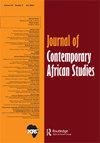喀麦隆“不听话的中产阶级”的崛起
IF 0.8
Q2 AREA STUDIES
引用次数: 0
摘要
摘要本文揭示了塑造非洲中产阶级特定阶层的地下和主观维度:个人主观主义过程,被理解为将自己构建为自己生活的行动者,反对政治、文化或经济统治。喀麦隆提供了一个富有洞察力的案例研究。该国大多数中产阶级都将自己的地位和经济状况归功于该政权的庇护制度。然而,我们的一系列传记采访显示,在20世纪90年代的民主抗议之后,那些决定改变生活方式的公民出现了新的主观主义。这个“思想灌输的中产阶级”的成员优先发展经济、媒体或文化项目,这些项目使他们能够实施不同的价值观,并建立摆脱政治政权文化和社会控制的空间,可能有助于建设一个更民主、更发达的喀麦隆。本文章由计算机程序翻译,如有差异,请以英文原文为准。
The rise of an ‘indocile middle class’ in Cameroon
ABSTRACT This article sheds light on subterranean and subjective dimensions that shape specific sectors of African middle-classes: processes of personal subjectivation, understood as the construction of oneself as an actor of one’s own life, against the hold of political, cultural or economic domination. Cameroon offers an insightful case study. Most of the country’s middle-class owns its status and economic situation to the regime’s patronage system. However, our series of biographical interviews shows the emergence of new subjectivities in citizens who decided to change the course of their lives following the 1990s democratic protests. Members of this ‘indocile middle-class’ have prioritised the development of economic, media or cultural projects that have allowed them to implement different values and set up spaces that escape the cultural and social control of the political regime and may contribute to a more democratic and better developed Cameroon.
求助全文
通过发布文献求助,成功后即可免费获取论文全文。
去求助
来源期刊

Journal of Contemporary African Studies
AREA STUDIES-
CiteScore
2.20
自引率
0.00%
发文量
18
期刊介绍:
Journal of Contemporary African Studies (JCAS) is an interdisciplinary journal seeking to promote an African-centred scholarly understanding of societies on the continent and their location within the global political economy. Its scope extends across a wide range of social science and humanities disciplines with topics covered including, but not limited to, culture, development, education, environmental questions, gender, government, labour, land, leadership, political economy politics, social movements, sociology of knowledge and welfare. JCAS welcomes contributions reviewing general trends in the academic literature with a specific focus on debates and developments in Africa as part of a broader aim of contributing towards the development of viable communities of African scholarship. The journal publishes original research articles, book reviews, notes from the field, debates, research reports and occasional review essays. It also publishes special issues and welcomes proposals for new topics. JCAS is published four times a year, in January, April, July and October.
 求助内容:
求助内容: 应助结果提醒方式:
应助结果提醒方式:


